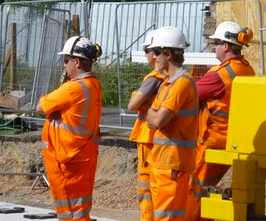If you’re the duty-holder of a commercial premise that was built prior to 1999, you have a legal duty of care to ensure those most at risk aren’t affected by Asbestos Containing Materials (ACMs). Thankfully, many businesses now offer training courses for those most at risk.
Apart from ensuring the course you choose is compatible with regulation 10 of the Control of Asbestos Regulations (CAR) 2006, you’ll want to know who should go on these courses and what the different courses cover.
Maintenance Workers
Easily the most at risk group, large numbers of maintenance workers die each year from previous exposure to asbestos. Maintenance workers the HSE identifies as being most at risk include anybody who will be cutting or drilling into walls, repairing boilers, laying cables, or doing work on roofs and ceilings. In short, anybody who may potentially disturb ACMs needs to be properly trained and informed of the risks.
Management and Planning Staff
As the duty-holder, you should nominate departmental managers and planning staff as Responsible Persons in regards to asbestos identification and maintenance. These will be the people whom employees are relying on for ongoing information.

HSE Managers
It stands to reason that your organisation’s chosen HSE Managers require training in asbestos management. Given that asbestos is the single largest health risk affecting Britain’s commercial sector, they will need to be alert to the detection and monitoring of ACMs, and have a working knowledge of your organisation’s risk management strategy.
Non-Employees Who May Be Affected by Asbestos-Related Work
Any non-employees who will be on the premises while work on asbestos-affected areas is being undertaken must be informed of where the work is being carried out, the associated risks regarding thoroughfares and fire exit relocation, and any other risks the asbestos-related work might expose them to. While not training as such, this information is vital.
Now let’s look the different courses, their objectives, and who they are most applicable to.
Asbestos Awareness Training
Anybody who is going to dig into the fabric of your building needs to do this course, so think of telecommunications and IT workers, construction workers, plumbers and gasfitters, demolition experts, and architects, to name but a few.
The objective of this training course is to provide workers and supervisors with the means to avoid asbestos disturbance during the course of their duties. The course covers the health impacts of asbestos exposure, the types of asbestos and ACMs found in commercial properties, risk avoidance, and the procedures to follow should an emergency occur.
Non-Licensable Work and Notifiable Non-Licensed Work Training
This training is required for workers who will undoubtedly be disturbing ACMs. This covers risk assessment, safe work practices and control measures, the selection of protective equipment, emergency procedures, and all relevant legal requirements. It’s important to understand this training doesn’t cover those licensed to work with high risk ACMs.
Licensable Work With Asbestos
In the interests of safety, it’s vital that you only hire licensed contractors who have received the appropriate training in line with the Licensed Contractors’ Guide HSG 247 and the Approved Code of Practice L143, Managing and Working with Asbestos. As a duty-holder, you’ll have your responsibilities as well, but any contractor licensed to work with asbestos will be able to explain these to you.
Training for HSE Managers, Management and Planning Staff, and Other Responsible Persons
Asbestos training for those responsible for the health and safety of employees should be tailored to their role. Dialogue must be entered into with these staff members regarding the details of forthcoming training, and what instruction and information they will receive.
Employers also have a duty of care to inform employees, Health and Safety Managers, and all responsible persons should significant deterioration air quality or ACM materials occur. This information should include a full explanation of what has happened and plans for remedial action.
Refresher Training
While not legally required, an annual refresher of courses in asbestos management will notify those concerned of any changes to legislation. It’s also an excellent chance to review your risk management strategy and action plan with the appropriate stakeholders.
Selecting the Best Trainers
Theory around asbestos is one thing but it’s recommended to look for trainers who have practical experience working with asbestos. They will have received the highest levels of training in order to obtain their license. They’ll also be able to provide surveys and asbestos removal should the need arise.
For more asbestos-related advice, get in touch with us today by calling 0800 011 2962 or contact us online.
